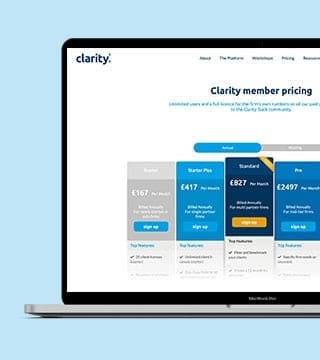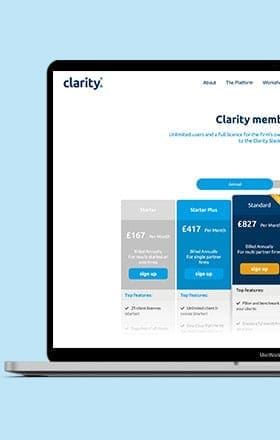Steve Briginshaw, COO of the Clarity platform, writes for Accounting Technician on all things business advisory. He covers the importance of business advisory in your firm, how to introduce and embrace business advisory within your practice, and, how to approach business advisory with your small business clients – without nagging!
Why is advisory becoming more important in the sector?
The first thing to mention is that advisory means different things to different people. So what we’ve done to help is identify the 5 levels of business advisory to explain how accountants and bookkeepers can help their clients at each level. It’s easier than most people think and provides huge value to the client, not just because they aren’t getting anything at the moment but because it really is valuable.
The reason business advisory is so important has two factors.
Clients are demanding it. They want their accountant to be someone who understands their business, communicates clearly and responds quickly as well as help them improve and grow their business, not just complete accounts and tax returns.
And accountants need to replace lost revenue. The price for compliance work is being squeezed due to technology improvements and new entrants in the market.
Clients now value accounts and tax returns even less than before. Previously they saw us as agents for HMRC and Companies House instead of being in their corner – filing accounts and tax returns is a necessary evil in their eyes and they begrudge paying for them but knew it was required (although I’m not practicing anymore I’m still a chartered accountant so forgive me for say us). But now because they think with Xero and MTD the work can be done at the touch of a button they devalue the compliance work even more and want to pay much lower prices.
And the barriers to entry in accounting are low but with technology they’re even lower. An accountant working out of their dinning room can now compete with much bigger firms offering the same service by leveraging cloud technology and serviced office meeting rooms. This is great for the client because it provides more choice but for the profession it is lowering prices, which isn’t such a bad thing on the whole as it’s enabling change.
Accountants need to replace that lost revenue and need to move from being compliance only services to compliance and business advisory.
What’s the risk to accountants and businesses if you don’t embrace advisory?
The risk to accountants who continue to only offer compliance services is they will see reducing revenue and reducing profit because their clients will go elsewhere or worse go out of business. The caveat of course is that there will always be a market for providing just accounts and tax returns at low prices, and those firms that do it will be benefit. But I’d imagine the market will reduce over the years as more business advisory services become even more affordable.
Accountants will also see the multiple of revenue reduce when they want to sell their firm because there will be too much supply of Baby Boomers and potentially Gen X accountants wanting to get out of accounting because they don’t want to offer business advisory services.
For businesses the risk is huge for not embracing business advisory. The survival rate of businesses in the UK are shocking – only 4 in 10 businesses survive 5 years – and we need to do more to help business owners. They don’t fail because of a bad products or services it’s because business owners don’t understand their numbers, don’t manage cash well enough, or have access to cash, and don’t have a clear plan. All things an accountant and bookkeeper can help with.
Just by moving the needle a tiny bit on these survival rates we’ll make a huge impact on the local and national economy because small business provides 60% of all private sector employment and 52% of all private sector revenue. [Source – House of Commons briefing paper, Business Statistics,12 December 2018]
What questions should advisors be asking clients at each advisory stage? How should they act on the information?
As we’re great with numbers, and numbers are the language of business, we should be using the numbers to explain where the business is now, asking where the business owner wants to get to and asking them how they’re going to get there. This is the first level of business advisory. It all stems from there and we can then ask questions based on what we see is happening with the numbers each month. It’s a simple repeatable process; plan, review and ask questions, set a new plan and hold them accountable until the next review.
Business owners always have the answers, they just don’t allocate the time to think about them or they may not know what questions to ask. We just need to create the time and space to ask the questions.
Simple questions such as:
“why was this job so much more profitable than the others and can it be repeated?”
“why is x cost higher than budgeted and what can be done to bring it in line?”
“how much extra money do you want this year?”
Can you suggest some proactive approaches to advisory?
Start off by giving the client awareness of where they are now and work with them to help them understand where they could get to. From there, simply hold you client accountable to getting the right stuff done. Better still, review the figures each month – whether that’s management reports, KPIs, budgets or cash flow forecasts – comparing them to the target and then setting actions for the next month whilst holding the client accountable.
If you’re not sure where to start with the above, simply call/email the client and tell them you’ve been thinking about them and believe they’re leaving profit and cash on the table.
The Clarity platform is a great place to start to have these proactive conversations and to hold your clients accountable.
How can you be more proactive without bugging the client?
Let’s break down proactive. To me it means timely, valuable and unprompted. If it’s truly proactive, the client won’t feel bugged. In addition, you need to really understand the client’s business to bring them proactive advice.
To expand further; the client needs to see what’s in it for them without them having to ask for it. As long as you explain this when contacting them, i.e. you’ve found something that’s working well in another industry that will help them get more profit/cash, another client had great success with this and got £x extra profit etc, they will be prepared to listen.
Good customer relationship management techniques to help build deep, trusting relationships with clients
Very simply its:
Listen, understand, be empathetic, help solve problems, respond quickly and deliver value.
Importance of body language and how to read it
The majority of language is construed by tone of our words and non verbal i.e. our body language, not what we actually say so body language is so important.
If someone has their arms folded they’re either feeling defensive, cross or simply cold. If someone has their hands on their lap or on a desk and making eye contact then they’re listening to what you have to say.
To help with connection, you can mirror the body language of your client but if they’re crossing their arms don’t copy them. Instead use a polite and understanding tone, keep eye contact, smile and keep you hands on your lap or on the desk.
Thank you to the AAT team for inviting Steve to write for their latest edition of the AAT magazine. #TeamClarity are keen to promote the importance of business advisory for accountants, especially as the face of the accountancy profession is changing in this digital age. The Clarity platform is empowering all of your team to deliver business advisory to all of your clients through our out-of-the-box solution. If you would like to speak to a member of the team, contact us on [email protected] for more information.






